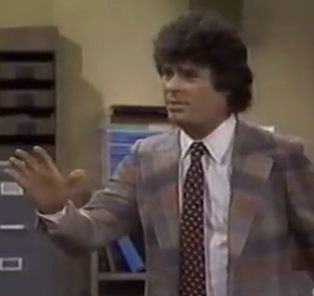In 1922...KHQ-AM, Spokane, Washington, began broadcasting. Louis Wasmer founded the pioneer radio station KHQ in 1922 in Seattle, as part of a motorcyle shop he owned. He later re-established the station in Spokane in 1925.
Although the KHQ calls are no longer used on the AM band, they still exist on TV.
The long time frequency of 590 kHz which KHQ used until 1985 is now occupied by KQNT.
The picture to the right is a view of the KHQ's tower on top of the Davenport Building probably from the 1940's based on the age of the automobiles pictured. KHQ was not using the tower at this time.
The KHQ and KGA signs are attached to the Radio Central Building which was being used by those station at that time.
In 1942...Frank Bonner, WKRP in Cincinnati's salesman Herb Tarlek, was born
In 1969...WABC FM starts “Love” format. The station went on the air on May 4, 1948 under the call sign WJZ-FM and in March 1953, the station's call letters were changed to WABC-FM following the merger of the American Broadcasting Company with United Paramount Theatres.
As most FM stations did during the medium's formative years, 95.5 FM simulcast the programming of its AM sister station.
In the early 1960s, however, WABC-FM began to program itself separately from WABC (AM). During the 1962–63 New York City newspaper strike, the station carried an news format for 17 hours daily. Two-and-a-half years before WINS launched its own around-the-clock, all-news format in April 1965, it was the first attempt at an all-news format in the New York market.
WABC's AM personalities, notably Dan Ingram, Chuck Leonard, and Bob Lewis, hosted programs on the FM side which were the total opposites of the Top 40-powered sound for which they were better known on AM. WABC-FM did continue to simulcast its AM sister station during Herb Oscar Anderson's morning drive program.
At the start of 1968, ABC split its radio network into four distinct components, one of which was dedicated to FM radio. The following year, WABC-FM and its sister stations–KABC-FM in Los Angeles; WLS-FM in Chicago; KGO-FM in San Francisco; WXYZ-FM in Detroit; KQV-FM in Pittsburgh; and newly acquired KXYZ-FM in Houston–began carrying an automated, youth-oriented, progressive rock format known as Love. Click Here for aircheck. Click Here for Part Two.
In 1983...the CBS series M*A*S*H ended after 11 seasons with a special two-and-a-half-hour finale that was watched by an estimated 121.6 million people -- 77 percent of the viewing public.
In 2001...WNSW 1430 AM dropped an adult standards format. Today the station, with the same call letters, airs a Spanish format.
In 2003...Sale of WEVD 1050 AM to ABC approved by FCC. Today WEPN-AM airs ESPN DePortes.
 |
| Hubcap Carter |
He got his nickname early in his career for spinning records — "real records, like spinning hubcaps," Lucia said.
On December 31, 1985, singer Ricky Nelson and his band were en route to KLUV's New Year's Eve Sock Hop, hosted by Ken "Hubcap" Carter. The plane crashed near DeKalb, Texas, killing Nelson and his entourage.
In 2006...CBS Radio sued Howard Stern, his agent, his company, and SIRIUS Satellite Radio for "compensatory and punitive damages for multiple breaches of contract, fraud, unjust enrichment, and misappropriation of CBS Radio's broadcast time". CBS Radio claimed Stern had violated his contract by improperly using his airtime on CBS stations to promote his January 2006 move to Sirius.
Stern "misappropriated millions of dollars' worth of CBS Radio air time for his own financial benefit," the 43-page lawsuit charged.
The contentious lawsuit was settle a few month later when Stern's new employer, Sirius Satellite Radio Inc, agreed to pay $2 million to CBS Radio in return for the rights to the classic recordings.
In 2008...John R. Gambling did his last show at 77 WABC
In 2009...ABC Radio commentator Paul Harvey died at the age of 90.
Harvey was born in Tulsa, Oklahoma. The son of a policeman killed in 1921, Harvey made radio receivers as a young boy. He attended Tulsa Central High School where a teacher, Isabelle Ronan, was "impressed by his voice." On her recommendation, he started working at KVOO in Tulsa in 1933, when he was 14. His first job was helping clean up. Eventually he was allowed to fill in on the air, reading commercials and the news.
 |
| Medal of Freedom 2005 |
Harvey then moved to Hawaii to cover the United States Navy as it concentrated its fleet in the Pacific. He was returning to the mainland from assignment when the Japanese attacked Pearl Harbor. He eventually enlisted in the United States Army Air Forces but served only from December 1943 to March 1944.
Harvey then moved to Chicago, where in June 1944, he began broadcasting from the ABC affiliate WENR. In 1945, he began hosting the postwar employment program Jobs for G.I. Joe on WENR. Harvey added The Rest of the Story as a tagline to in-depth feature stories in 1946.
On April 1, 1951, the ABC Radio Network debuted Paul Harvey News and Comment "Commentary and analysis of Paul Harvey each weekday at 12 Noon". Paul Harvey was also heard originally on Sundays; the first Sunday program was Harvey's introduction. Later, the Sunday program would move to Saturdays. The program continued until his death.




No comments:
Post a Comment
Note: Only a member of this blog may post a comment.